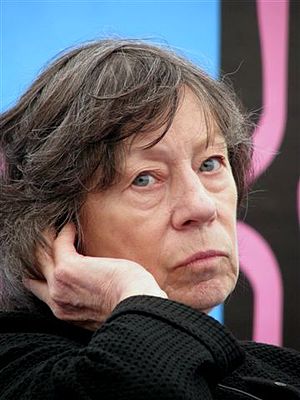Difference between revisions of "Laura Mulvey"
| Line 4: | Line 4: | ||
During the 2008–09 academic year, Mulvey was the Mary Cornille Distinguished Visiting Professor in the Humanities at Wellesley College. Mulvey has been awarded three honorary degrees: in 2006 a Doctor of Letters from the University of East Anglia; in 2009 a Doctor of Law from Concordia University; and in 2012 a Bloomsday Doctor of Literature from University College Dublin.<ref>https://en.wikipedia.org/w/index.php?title=Laura_Mulvey&oldid=1147883880</ref> |
During the 2008–09 academic year, Mulvey was the Mary Cornille Distinguished Visiting Professor in the Humanities at Wellesley College. Mulvey has been awarded three honorary degrees: in 2006 a Doctor of Letters from the University of East Anglia; in 2009 a Doctor of Law from Concordia University; and in 2012 a Bloomsday Doctor of Literature from University College Dublin.<ref>https://en.wikipedia.org/w/index.php?title=Laura_Mulvey&oldid=1147883880</ref> |
||
| + | |||
| + | Mulvey is credited with coining the phrase [[The Male Gaze]] in her 1975 article [[Visual pleasure and narrative cinema]]. |
||
== See Also == |
== See Also == |
||
Revision as of 08:04, 4 June 2023
Laura Mulvey (born 15 August 1941) is a British feminist film theorist. She was educated at St Hilda's College, Oxford. She is currently professor of film and media studies at Birkbeck, University of London. She previously taught at Bulmershe College, the London College of Printing, the University of East Anglia, and the British Film Institute.[1]
During the 2008–09 academic year, Mulvey was the Mary Cornille Distinguished Visiting Professor in the Humanities at Wellesley College. Mulvey has been awarded three honorary degrees: in 2006 a Doctor of Letters from the University of East Anglia; in 2009 a Doctor of Law from Concordia University; and in 2012 a Bloomsday Doctor of Literature from University College Dublin.[2]
Mulvey is credited with coining the phrase The Male Gaze in her 1975 article Visual pleasure and narrative cinema.
See Also
This article contains information imported from the English Wikipedia. In most cases the page history will have details. If you need information on the importation and have difficulty obtaining it please contact the site administrators. Wikipedia shows a strong woke bias. Text copied over from Wikipedia can be corrected and improved.
